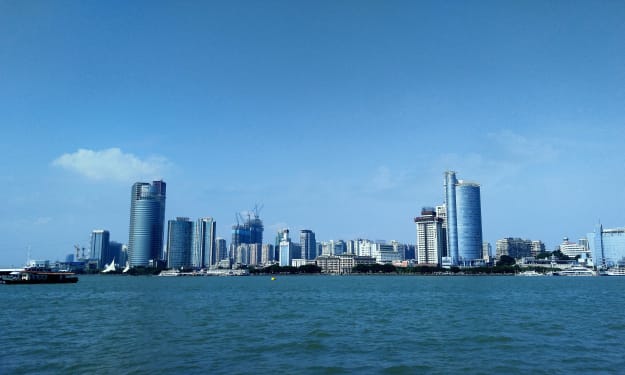The world's refugee camps are a huge pool of talent
Spirit of entrepreneurship

A South Sudanese refugee picks kernels of corn at the Karobeye settlement outside Kakuma refugee camp in Turkana County, northwest of Nairobi, Kenya, on Jan 31, 2018.
Joelle Hangi is a refugee artist and writer and director of Kakuma Refugee Camp in Kenya
Forced migration is a political hot potato. With global displacement hitting record highs every year and foreign aid falling, climate refugees are now expected to surge. So we will all be subject to forced migration for years to come.
There are many policy and practical barriers that make it difficult for displaced persons to contribute to the global economy, such as fewer working documents in host countries and limited freedom of movement for people. Concerns about the impact of migration on host countries have led to long-term instability in the global community. That means we're giving up on the valuable entrepreneurial spirit that immigrants bring to the economy -- and ignoring the research that shows the rewards of investing in immigrants.
Can we live with the consequences? The workforce of some G20 countries is expected to shrink significantly over the next few decades because of demographic changes and ageing populations. In the European Union alone, the workforce is expected to shrink by 9 percent by 2030 and 28 percent by 2060. These Labour shortages can be met by talent living in refugee camps. Countries such as Canada have recognized the economic potential of refugees and are filling their workforce with refugee talent.
Investing in refugees today can yield huge economic benefits over the next 5-10 years.
Given the current political discourse, connecting people in refugee camps to the global economy requires highly innovative measures. About 78 percent of refugees face long-term homelessness, with some having been displaced for up to 40 years. Technology can provide these people with services they never had before; They tend not to have bank accounts, so some start-ups are using fintech to provide them with savings and loans. E-commerce and the Internet can greatly increase economic opportunities and connect refugee talent to global needs.
An aerial view shows recently constructed houses at Kakuma refugee camp in Turkana County, northwest of Nairobi, Kenya, on Jan 31, 2018.
In 2018, a group of dynamic young global leader BBS, influential and rich intellect went to Kenya northwest card library horse camp, cooperate with the United Nations refugee agency (UNHCR), thinking about how to use their energy resources, network, organization, and wisdom to find new methods to solve the problem of long-term humanitarian. Despite multiple constraints, Kakuma, with a population of nearly 187,000 and a GDP of nearly $56 million, is an important engine of economic development in Kenya's Turkana County. This is a good example of the entrepreneurial spirit and strength of the displaced.
In this article, we want to show you the benefits that refugee talent can bring when freed from bondage. Joelle, a recent arrival at the camp, was unable to win a scholarship and was unable to pursue higher education. But that didn't stop her from studying English, film, photography and journalism. For two years, she worked as a volunteer human resources assistant for the International Rescue Committee (IRC).
In 2015, she received support from the Jesuit Global Learning charity for distance learning at Regis University, a private Jesuit university in Denver, Colorado, and graduated in 2018. She is now pursuing a bachelor's degree in business communications at Southern New Hampshire University.
The camp offers a number of degree programmes, many of which encourage entrepreneurship and aim to tap the intellectual potential of displaced people. But questions remain about how the refugees will use their talent.
Despite her success, Hangi feels she has touched the invisible ceiling where her educational and professional ambitions are limited. She had the potential and skills to contribute to the global economy, but was not given the opportunity. She was able and very keen to make ends meet for herself, her family and her community through work, but was forced to rely on humanitarian assistance.
Building on the partnership they established last year, this month Young Global Leaders will return to Kakuma to share their experiences with residents of the refugee camp and Turkana community. Harnessed the power of their organizations and individuals, they teamed up with UNHCR, the Aliko Dangote Foundation and Oxford University's Centre for Refugee Studies to launch a three-month entrepreneurship and mentoring programme with technical support from iamtheCODE. Despite the difficulties, the project's goal is to open up new and meaningful ways for displaced people to communicate, so that they can contribute to the global economy.
They designed the course based on tutorial research to reconstruct entrepreneurship training in refugee Settings. In startup circles, mentoring is crucial: studies show that 33 percent of entrepreneurs mentored by successful entrepreneurs make the best employees; Companies that are mentored by experienced entrepreneurs are about twice as likely to achieve their best performance. Building on the many entrepreneurial support programs that work with low-productivity microbusinesses, the training program will focus on technologically robust scalable initiatives that have the potential to link to larger economic trends. Refugees are looking for skills, and young global leaders will use this opportunity to share their skills with them.
Connecting refugee talent to the global economy is challenging, and not an easy task, especially given our current political realities.
The main obstacle facing refugees is lack of opportunity. Humanitarian relief fails to recognize the benefits that these people can bring to world development. As hard as the refugees study, they don't know where they can present their business plans, job applications or investment portfolios.
The efforts of the Young Global Leaders Forum will not provide a panacea. But we are bound to come up with new and valuable ideas and approaches to promoting honest exchanges between exceptional leaders in and outside the camps.






Comments
There are no comments for this story
Be the first to respond and start the conversation.